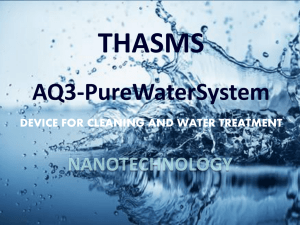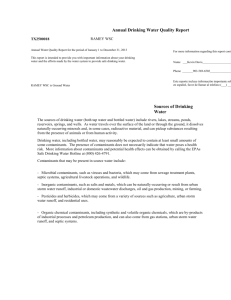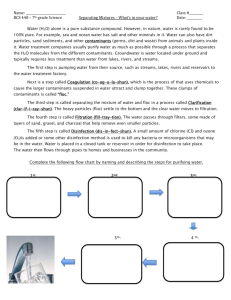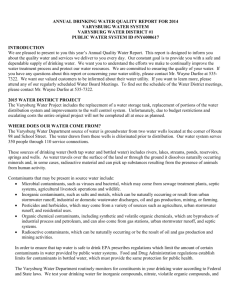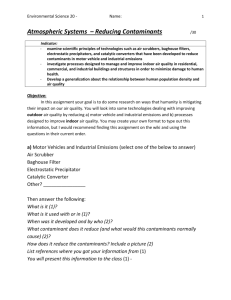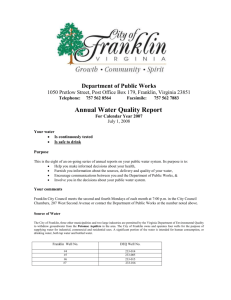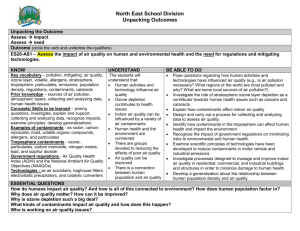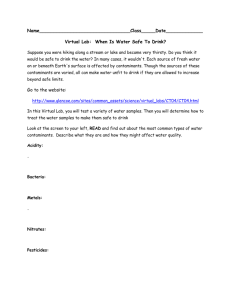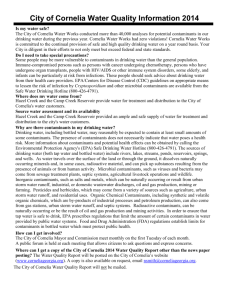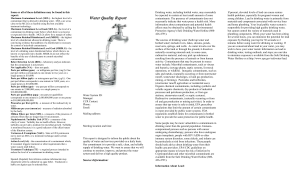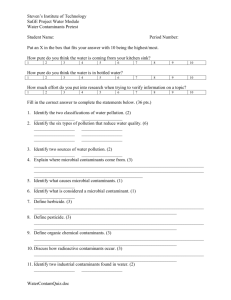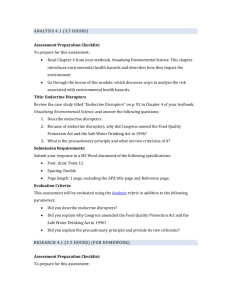THASMS Presentation in English
advertisement
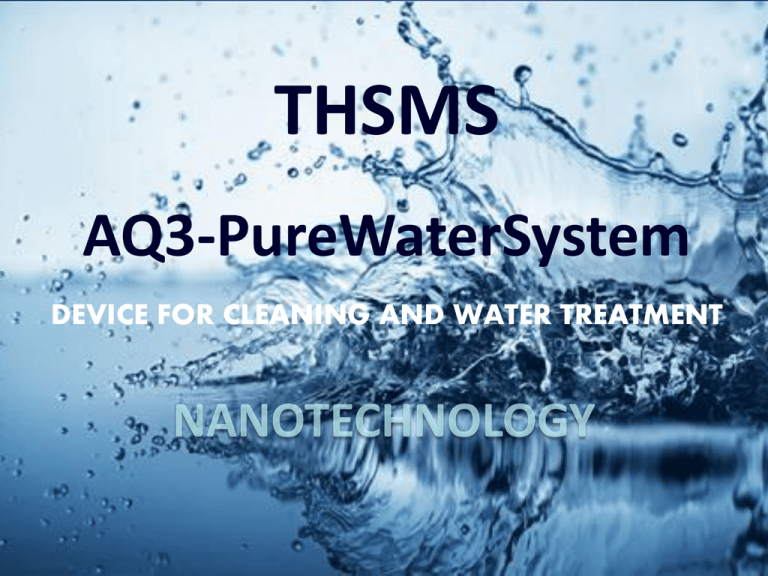
THSMS AQ3-PureWaterSystem DEVICE FOR CLEANING AND WATER TREATMENT THSMS AQ3 Eliminates • • • • • • Salts Viruses Bacteria All the organic and inorganic impurities (up to the molecular level) Radioactive substances THSMS Units can recycle and purify any toxic water into clean drinking water, again and again. Today’s Global Water Crisis has created an urgent need for THSMS AQ3 water units! APPLICATIONS • Purifies water contaminated with micro-organisms and organic and inorganic materials – cleans filthy RIVERS! • Produces drinking water and utility; for use in Pharmacy, Food and other industrial sectors, including Agriculture • Recycles and purifies all Waste Water; preventing depletion of the environment • Desalination of sea water • Produces drinking water and utility water for agriculture and industrial recycling cleaning systems • Regenerates and re-recovers any Waste Water in all fields of human activities, including natural sources. THSMS-AQ3 Pure Water System Technology The Technical Parameters • • • • • • • • • • • • • • • • • Type of treatment of contaminant - totally non-chemical(physical) or mechanical treatment type of an output product: technological and drinking water Technology of treatment: compounded TMC and amorphous alumino-silicate filtration, cascading mechanical filtration , membrane hybrid separation Maintenance of equipment: Non-chemical, using levitation of particles in pulsating multispectral electromagnetic field based on principal of magnetic and ultrasound resonance. Performance of the equipment : min 0,5m3 , max 10m3 per day purified technological and drinking water in one module, minimum possible waste concentrate Automatic control of operation, 600 - 1200 liters / 24 hour, Visual and audible fault indication The operating pressure in the system : 2,3 - 3,8 bar , in turbo mode 9-16 bars, The temperature of input water : min 4 deg C - max 45 deg C. TDS: > 10 000 ppm, SDI: > 10 turbidity, pH: 0 - 14 Power input : min 0,75 and max 2,5Kw, Power consumption. Energy from 55 to 100 W / h Affectivity of filtration : min95 , max 98 % Refuse concentrate : 70 : 1 after moisture elimination Type of separation: bacteriological, biological, mineral, chemical, gaseous Elimination of refuse; concentrated solids will be used in additional processing program Longevity of the system : when periodically maintained : 30 years Source of contaminant may be a river, lake, artesian well, pool, well, brackish water, rain water tank, process tank or overflow of wastewater treatment Output is a modified water technology, according to further sterilized, remineralization, oxygenated, ionized, structured, etc. ... Storage tank plastic or stainless steel from 12 L to 350 L, Design frame, gauges, UV lamps - stainless steel - Extremely low power consumption - Low input and output pressures - Operation of the network, battery or solar panel - Noise level to 15 db - Super compact design - The minimum possible size - Wall and floor - The minimum possible pulse waste - The maximum possible output per hour - Two types of water technology; remineralization and sterilization - Triple check, extreme bacteria-FREE -- Vacuum extraction of membrane permeate - Optimized linear regulation waste - A combination of composite and hollow fiber membrane - The possible operation without power. Energy, at reduced performance - Traffic can be switched on turbo + 30% - Best price-performance ratio - The best ratio of treated wastewater and the market - Low maintenance costs - Customer service - Extremely long life with stable parameters - Optimization of operating conditions on the ground - Automatic pulse cleaning dynamic membranes - Automatic control of activity and intensity of UV lamps - Automatic level control mineralization - Stainless steel main parts • • • • • • • • • • • THSMS-AQ3 is an unrivalled providing the highest efficiency water purifying technology Its high capacity can meet global municipal and industrial recycling needs Produces water for any use from demineralised to drinking; with easy control increasing the mineral contents and oxygen to specially adjusted water for pharmacy, the food industry and the industry. Super-affordable in comparison with traditional solutions Significant lower operating costs & minimum energy consumption Long life - 30 years for the regular maintenance Electronic monitoring and control at a distance Small units can be modified to fit any system, easy to install Solar activated – goes to work immediately Environmental benefits of reduced water pollution and sustainable water-use Improves health and can reduced disease and deaths in third world countries AQ3_200_4_UV_REM_SOL AQ3_200_4_UV_REM_PWR TYPES of EQUIPMENT • Water filtration for a family (capacity 0,5 M3 – 2,) as drinking water plus utility water, a substantial reduction in consumption of water, as well as the reduction in pollution of the environment • Full recycling of water systems; complete separation of objects from the source water (sanitation sought by survivalists) • Purifies systems and offers standby management of water for farms and agricultural farms with inadequate resources of safe water • Desalination of water systems for ships and areas without enough fresh water (solar panel activated) • Systems cleaning and adjustments of water for villages and towns • Systems cleaning and adjustments of water for industrial use • Mobile water cleaning systems and adjustments of water for the army, industry, agriculture and ecology THSMS -AQ3 Pure Water System is able to clean water from any types of contaminants with 99.9% efficiency All Types Micro-organisms • All species micro-organisms Cryptosporidium, Giardia lamblia, Heterotrophic plate count, Legionella, total Coliforms (including fecal and E.Coli), Turbidity, Viruses (enteric) Disinfection • Acids. Bromate, Chlorite, Haloacetic, total Trihalomethanes (TTHMs), Chloramines (as Cl2), Chlorine (as Cl2), Chlorine Dioxide (as ClO2) Inorganic Substances • Antimony, Arsenic, Asbestos, Barium, Beryllium, Cadmium, Chromium, Copper, Cyanide, Fluoride, Lead, Mercury, Nitrate, Nitrite, Selenium, Thallium Organic Substances • Acrylamide, Alachlor, Atrazine, Benzene, Benzo (a) pyrene (PAH’s), Carbofuran, Carbon Tetrachloride, Chlordan, Chlorobenzene, 2,4 -D Dalapon, 1,2 - Dibromo-3 -chloropropane (DBCP), o-Dichlorobenzene, p-Dichlorobenzene, 1,2 Dichloroethane, 1,1 -Dichloroethylene, cis-1,2 -Dichloroethylene, trans-1,2 -Dichloroethylene, LEM, 1,2 -Dichloropropane, di(2 -ethylhexyl) adipate, Di- (2 -ethylhexyl)phthalate, Dinoseb, Dioxin (2,3,7,8 -TCDD), Diquat, Endothall, Endrin, Epichlorohydrin, Ethylbenzene, Ethylene Dibromide, Glyphosate, Heptachlor, Heptachlor z , Hhexachlorobenzén, Hexachlorocyclopentadiene, Lindane, Methoxychlor, Oxamyl (vydate),, Polychloronared, biphenyls (PCBs), Pentachlorophenol, Picloram, -, Styrene, Tetrachlorethane, Toluenu, Toxaphene, 2,4,5 -TP (silvex), ), 1,2,4-Trichlorobenzene, 1,1,1-Trichloroethane, 1,1,2-Trichloroethane, Trichloroethylene, Vinyl chloride, Xylenes (total) Radio-Nuclides • Alpha particles, Beta particles and photon emitters, Radium 226 and Radium 228 (combined), Uranium COMMUNITY WASTE WATER Pathogens: (Giardia Lamblia, Salmonella, Shigella, Typhoid, Yersinin enterocolitica and Viral Hepatitis and others) Non-metallic contaminants: (phosphates, nitrogen and others) Synthetic organic contaminants: (pharmaceutical drugs, chlorinated solvents, hydrocarbons and others) INDUSTRIAL WASTE WATER: Metallic contaminants: (aluminum, arsenic, barium, cadmium, copper, chromium, iron, lead, lithium, manganese, mercury, molybdenum nickel, silver, uranium, and zinc) Non-metallic contaminants: (acids, ammonia, nitrate, phosphates, boron, chloride, cyanide, fluoride, radium, selenium, sulfates and various radioactive isotopes) Synthetic organic contaminants: (pesticides, chlorinated solvents, hydrocarbons and poly-chlorinated biphenols (PCBs) and others) FILTHY RIVER: Combination of all contaminants : pathogens, metallic contaminants, non-metallic contaminants, synthetic organic contaminants from community, industrial and agricultural waste water. 4 toxins THSMS technology removes from water: •Pathogen (for instance: Escherichia coli) , THSMS remove more than 99%, quantity depends on the concentration in 1 liter of water •Non-metallic contaminants (for instance: nitrate), THSMS remove more than 99%, quantity depends on the concentrations in 1 liter •Metal contaminants (for instance mercury:), THSMS remove more than 99quantity depends on the concentration in 1 liter of water •Synthetic organic contaminants (for instance: pesticides), THSMS remove more than 99%, quantity depends on the concentration in 1 liter of water.
